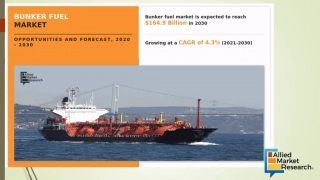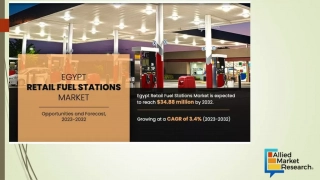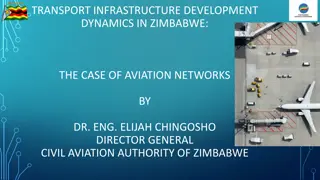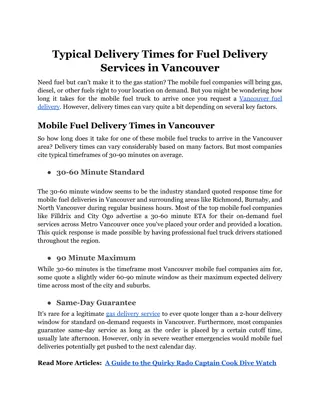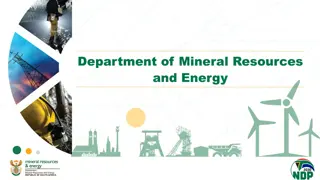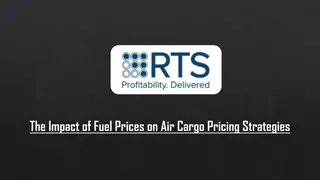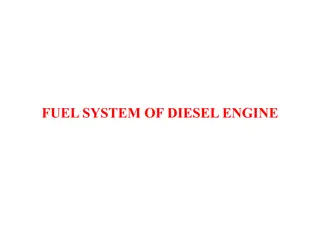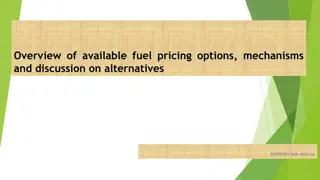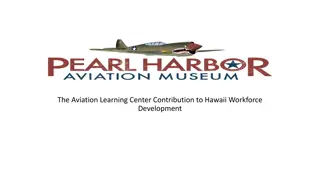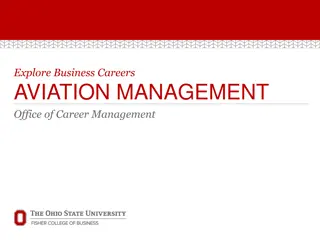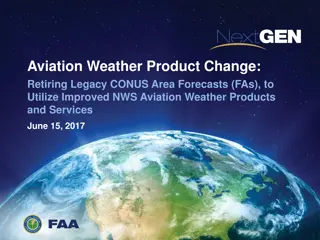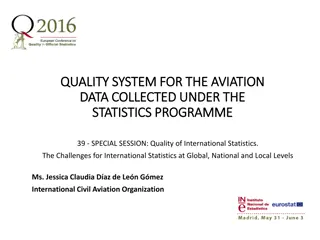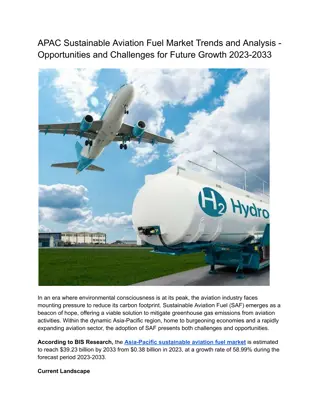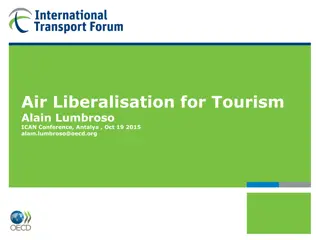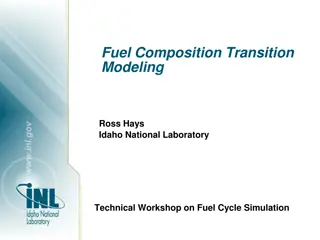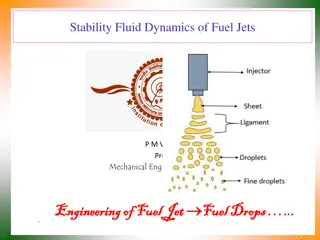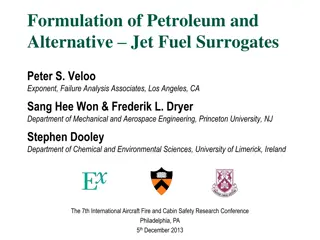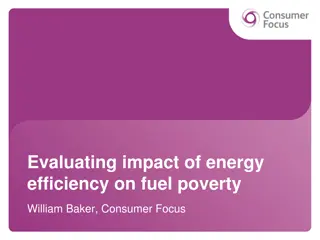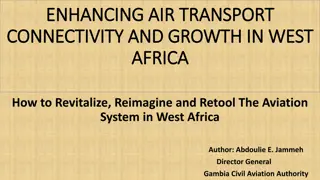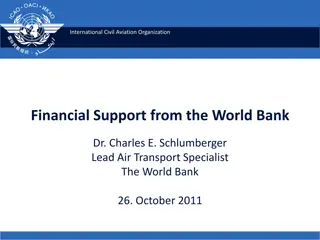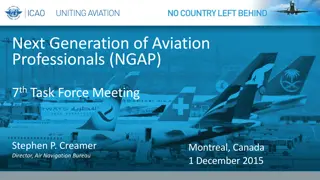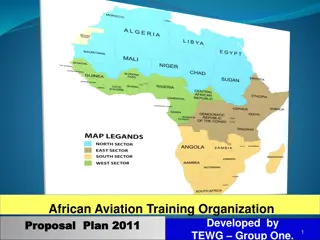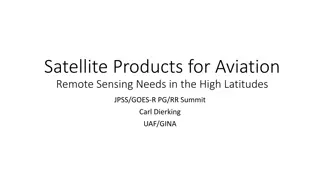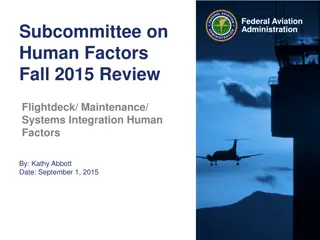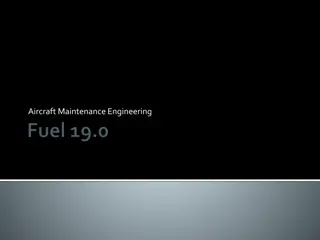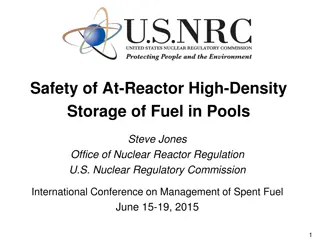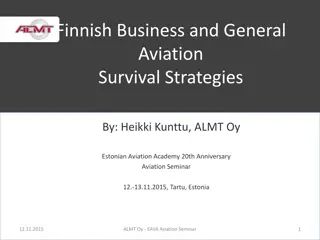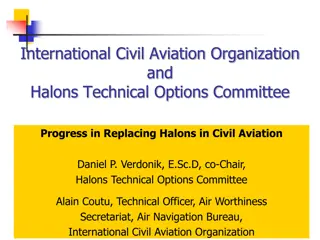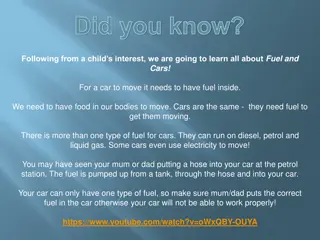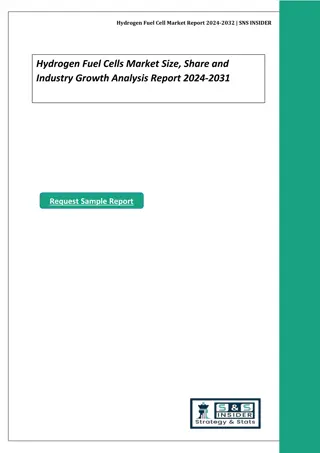Bunker Fuel Market
Bunker fuel is a fuel oil used in marine vessels. It is poured into the ship bunkers to keep the engines running. Ships use three types of marine fuels, which include high sulfur fuel oil, low sulfur fuel oil, and diesel oil. Presently, growth in awareness toward reducing environmental pollution and
2 views • 6 slides
Bunker Fuel Market
Bunker fuel is a fuel oil used in marine vessels. It is poured into the ship bunkers to keep the engines running. Ships use three types of marine fuels, which include high sulfur fuel oil, low sulfur fuel oil, and diesel oil. Presently, growth in awareness toward reducing environmental pollution and
1 views • 6 slides
Bunker Fuel Market
Bunker fuel is a fuel oil used in marine vessels. It is poured into the ship bunkers to keep the engines running. Ships use three types of marine fuels, which include high sulfur fuel oil, low sulfur fuel oil, and diesel oil. Presently, growth in awareness toward reducing environmental pollution and
6 views • 6 slides
Egypt Retail Fuel Stations Market
A fuel station, also known as a petrol station, gas station, service station, or filling station, is a retail outlet that sells motor vehicle fuel to vehicle owners. Fuel stations provide various fuels including diesel, petrol, gasoline, kerosene, and ethanol. The main components of a fuel station i
4 views • 6 slides
South Sudan Civil Aviation Authority Overview
South Sudan Civil Aviation Authority (SSCAA) was established in 2012 to regulate the aviation industry in South Sudan. As a member of ICAO, SSCAA aims to provide efficient, safe, secure, reliable, and affordable aviation infrastructure and services. Challenges include financial autonomy and meeting
1 views • 10 slides
Development Dynamics of Aviation Networks in Zimbabwe
Aviation plays a crucial role in Zimbabwe's economic growth, with the government focusing on infrastructure development to position the country as a regional aviation hub by 2030. Initiatives include strengthening civil aviation systems, enhancing airport infrastructure, and prioritizing safety and
2 views • 15 slides
Typical Delivery Times for Fuel Delivery Services in Vancouver
Need fuel but can't make it to the gas station? The mobile fuel companies will bring gas,\ndiesel, or other fuels right to your location on demand. But you might be wondering how\nlong it takes for the mobile fuel truck to arrive once you request a Vancouver fuel\ndelivery. However, delivery times c
9 views • 4 slides
green hydrogen market
green hydrogen is used as fuel to provide a sustainable mobility alternative. Fuel cells make vehicles more efficient and quieter; using green hydrogen allows vehicles to travel longer distances with less refueling. The increase in demand for green hydrogen is also due to growing government initiati
1 views • 3 slides
Preliminary Analysis of Fuel Dependence and E-Mobility in the Pacific
This study by PhD Candidate Edoardo Santagata at UNSW delves into the fuel dependence and potential for e-mobility in the Pacific region. It includes data collection on energy consumption, fuel demand, vehicle registrations, and scenarios for electric vehicle integration. Preliminary findings highli
1 views • 17 slides
Fuel Pricing Mechanisms and Regulatory Framework Presentation
This presentation to the Portfolio Committee on Mineral Resources and Energy delves into the Basic Fuel Price (BFP) for liquid fuels, covering global fuel pricing forms, policy positions, key pricing mechanisms, regulatory mandates, and the intricate structure behind fuel prices. It explains how the
2 views • 28 slides
The Impact of Fuel Prices on Air Cargo Pricing Strategies
The aviation industry is significantly influenced by fluctuating fuel prices, impacting operational costs and subsequently, air cargo pricing strategies. As one of the most variable and substantial expenses for airlines, fuel prices necessitate dynam
0 views • 5 slides
Understanding the Fuel System of Diesel Engines
During operation, a diesel engine's fuel system plays a crucial role in delivering clean fuel to the combustion chamber. The system comprises components like fuel filter, fuel lift pump, fuel injection pump, atomizers, and high-pressure pipes. Proper maintenance is essential to ensure efficient oper
5 views • 12 slides
Fuel Pricing Mechanisms and Regulation Overview
Explore the various fuel pricing options and mechanisms available, including a discussion on alternatives for fuel pricing regulation. The objectives of fuel price regulation, classifications of fuel pricing in the Pacific Islands, and options such as regulating fuel price and tendering national fue
1 views • 11 slides
The Aviation Learning Center: Empowering Hawaii's Workforce
The Aviation Learning Center (ALC) at the Pearl Harbor Aviation Museum offers an immersive hands-on learning experience for students of various age groups, focusing on aviation concepts and practical applications. The program includes educational modules, flight simulators, and a curriculum aligned
0 views • 7 slides
Explore Careers in Aviation Management
Aviation management involves overseeing flight operations and preparing students for professional positions in the aviation industry. Success in this field requires adaptability, communication, critical thinking, problem-solving, teamwork, and the ability to work under pressure. Sample roles include
0 views • 8 slides
Transition of Legacy CONUS Area Forecasts in Aviation Weather Modernization
On June 15, 2017, the National Weather Service announced a transition plan to retire legacy CONUS Area Forecasts (FAs) and adopt improved aviation weather products and services. The transition period will last three months, with full implementation expected by October 10, 2017. The goal is to enhanc
5 views • 9 slides
Quality System for the Aviation Data in ICAO
International Civil Aviation Organization (ICAO) is responsible for collecting, analyzing, and disseminating statistics related to civil aviation. The quality system for aviation data ensures relevance, accuracy, timeliness, accessibility, comparability, and coherence of the collected data. ICAO's s
0 views • 7 slides
APAC Sustainable Aviation Fuel Market Trends and Analysis
The Asia-Pacific sustainable aviation fuel market is estimated to reach $39.23 billion by 2033 from $0.38 billion in 2023, at a growth rate of 58.99% during the forecast period 2023-2033.\nRead Report Overview: \/\/bisresearch.com\/industry-report\/a
6 views • 3 slides
The Role of Psychology in Aviation Safety Culture
Psychology plays a crucial role in building a culture of aviation safety by studying and preempting the psychological stressors faced by aviation staff. Aviation psychology focuses on human behaviors, cognitive functioning, and emotional processes in the complex aviation environment, with a history
0 views • 24 slides
Role of Aviation in Tourism Liberalisation and Development
Explore the significance of aviation in tourism liberalisation through insights on the International Transport Forum, tourism impact on GDP, employment, and exports, tourists' preferences for freedom in air travel, and a comparison of aviation with other tourism services. The content delves into the
0 views • 12 slides
Fuel Composition Transition Modeling in Two-Stage Recycling Reactors
Modeling the transition of fuel composition in a two-stage recycling reactor scenario poses a unique challenge that previous versions of VISION were unable to address. By tracking fuel mass and isotopics through various stages of the fuel cycle, VISION now enables the modeling of reactors with recip
0 views • 15 slides
Insights into Fuel Jet Stability and Dynamics
Explore the complex realm of fuel jet stability and dynamics, including topics such as Kelvin-Helmholtz instability, liquid breakup postulations, geometric features of fuel sprays, penetration of spray into air, and more. Gain a deeper understanding of fuel drop formation, spray parameters, structur
1 views • 18 slides
Advances in Aviation Fuel Surrogates and Computational Modeling
This study explores the formulation of petroleum and alternative jet fuel surrogates, coupling chemical kinetics with computational fluid mechanics for engine design, and the variability of aviation fuels. It delves into the concept of surrogate fuel models, previous research on jet fuel surrogates,
0 views • 20 slides
Understanding Energy Poverty and Its Impact on Fuel Poverty in Europe
Evaluating the impact of energy efficiency on fuel poverty, this study examines the emergence of energy poverty in the EU, factors driving fuel poverty across Europe, and UK's definition of fuel poverty. It discusses various policies and strategies implemented to address fuel poverty, emphasizing th
0 views • 16 slides
Fuel Cycle Analysis Toolbox: Enhancing Understanding and Optimization
This presentation focuses on the analyses and evaluations essential for assessing the potential of a fuel cycle, emphasizing different time scales, system sizes, objectives, and audiences. It discusses the need for coupled analyses, various tools required, and opportunities for improvement through i
1 views • 11 slides
Enhancing Air Transport Connectivity and Growth in West Africa: Strategies for Revitalizing the Aviation System
Abdoulie E. Jammeh, Director General of Gambia Civil Aviation Authority, discusses the pre-COVID-19 achievements in the aviation sector in West Africa and the current/future challenges faced due to the pandemic. The article emphasizes on revitalizing, reimagining, and retooling the aviation system b
0 views • 6 slides
Enhancing Aviation Career Opportunities in Singapore
Promoting aviation careers in Singapore is a priority for the Civil Aviation Authority of Singapore (CAAS) under the SkillsFuture initiative. The Sectoral Manpower Plan aims to uplift the quality of manpower in the aviation industry by addressing challenges such as attracting local talent, providing
0 views • 21 slides
World Bank Support for Pacific Aviation Development
The World Bank has been actively involved in providing financial support for aviation development projects, particularly in the Pacific region. Through initiatives like the Pacific Aviation Investment Program and support for the Pacific Aviation Safety Office, the World Bank aims to enhance infrastr
0 views • 16 slides
Next Generation of Aviation Professionals (NGAP) Task Force Meeting Overview
The Next Generation of Aviation Professionals (NGAP) Task Force meeting was held on December 1, 2015, in Montreal, Canada. The NGAP aims to develop strategies for attracting, training, and retaining aviation professionals to ensure a safe and sustainable global air transportation system. The Task Fo
0 views • 24 slides
Proposal for the Creation of African Aviation Training Organization (AATO)
The proposal outlines the development of AATO, a continental body aimed at standardizing and harmonizing aviation training in Africa. Four Regional Aviation Training Boards will collaborate with ICAO to enhance accreditation and training quality across the continent, addressing common challenges fac
0 views • 23 slides
Satellite Products for Aviation Remote Sensing Needs in High Latitudes
Addressing the specific needs of aviation remote sensing in high latitudes, this content explores the importance of satellite products, variations in equipment requirements, data expectations, and the significance of cloud products for aviation safety. Feedback from aircraft operators emphasizes the
0 views • 8 slides
Federal Aviation Administration Subcommittee on Human Factors Fall 2015 Review
This document discusses the review of flight deck and maintenance systems integration human factors by Kathy Abbott in September 2015. It outlines the purpose, benefits, and success factors of the BLI Portfolio Overview related to human factors in aviation operations. Furthermore, it presents core f
0 views • 10 slides
Comprehensive Overview of Aircraft Maintenance Engineering and Fuel Systems
Explore the intricate world of aircraft maintenance engineering encompassing fuel types, storage, lines, valves, filters, tanks, and more. Delve into AVGAS and JET fuels, their properties, and applications in operations. Gain insights into fuel tanks construction, fuel lines management, and the impo
0 views • 25 slides
Investigation of Swelling in Uranium-Plutonium Nitride Fuel for Helium Gas Fabrication and Liquid Metal-Bonded Test Fuel Rods
This study examines the specific details of swelling in uranium-plutonium nitride fuel used for fabrication of helium gas and liquid metal-bonded test fuel rods. Key irradiation parameters, examination techniques, and the structural and phase state of SNUP fuel after low-temperature irradiation are
0 views • 18 slides
Enhancing Safety and Management of Spent Fuel in High-Density Storage
This informative presentation delves into the safety measures and regulatory changes surrounding the storage of spent fuel in high-density pools. Topics covered include the design of spent fuel pools, historical regulatory activities, past studies on fuel uncovery risks, and advancements in analytic
0 views • 17 slides
Challenges and Strategies in Finnish Aviation Industry
The Finnish aviation industry faces challenges in general and business aviation, with rising costs, older pilot demographics, and declining interest among the youth. ALMT Oy discusses survival strategies and adaptation measures at the Estonian Aviation Academy seminar.
0 views • 11 slides
Progress in Replacing Halons in Civil Aviation: ICAO Initiatives
In the journey to replace halons in civil aviation, the International Civil Aviation Organization (ICAO) has made significant strides with the Halons Technical Options Committee. Starting from the engagement in 2003 to the establishment of mandates in 2010, various decisions and agreements have shap
0 views • 9 slides
Exploring Fuel and Cars: A Child's Guide
Cars need fuel to move, just like we need food to function. There are different types of fuels for cars, including diesel, petrol, liquid gas, and electricity. Learn how oil is formed, extracted from the earth, and processed into fuel. Explore the journey of fuel from oil rigs to your car's tank. Di
0 views • 6 slides
Hydrogen Fuel Cell Market
\nHydrogen Fuel Cells Market Size, Share & Segmentation By Product Type (Liquid-Cooled Type and Air-Cooled Type), By Technology Type (Polymer Exchange Membrane Fuel Cells (PEMFC), Phosphoric Acid Fuel Cells (PAFC), Solid Oxide Fuel Cells (SOFC), Dire
1 views • 8 slides
Understanding Fuel Cells: Definition, Working, and Applications
Fuel cells are electrochemical cells that generate electricity through reactions between fuel and an oxidizing agent like oxygen. They offer high efficiency compared to traditional power plants. The working of fuel cells involves hydrogen and oxygen reacting to produce electricity. NASA has utilized
0 views • 20 slides


